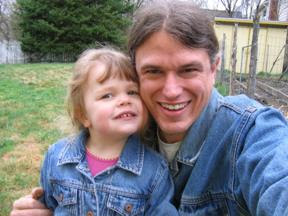Part of the inspiration for Rabbit was actually Butch Cassidy. I was watching one of those "Movies with Commentary" shows in Boston ("The Movie Loft," if that means anything to anyone). The commentator remarked that Cassidy was neither the cleverest, nor the toughest, nor the best gun in the gang. Why did people follow him? "Because they liked him." Interesting, I thought. The hero who is the leader simply for his relationships with people, without force, title, or cunning.
I wrote an entire draft of the novel with the wizard and the honky Rabbit, before I realized that was wrong. I axed the wizard, ultimately, because he was too standard. I've always had trouble with the role-playing convention of having both wizards and priests, both casting spells but drawing on different power. How can there be gods who shaped the order of the universe, and a power in the universe that is other than what the gods shaped. Magic and religion have to be integrated, I've always thought.
In historical examples, this is always the case. Magic and the sacred are never separate realms. Granted, in medieval Europe, witches and priests were co-existent and separate. But they both drew on the same divine power. When a priest performed a miracle, it was the power of God. When a witch cast a spell, it was the power of Satan.
So how did Rabbit finally become a part of a tribal people? I think I knew he ought to be before he did. When I finally agreed that he needed to, I had to square my shoulders and take a deep breath. I'd been afraid to do it. I didn't want to be accused of co-opting Indian culture, or making a poor-Indian story, or anything of that nature. But then I realized that what I was doing instead was writing a story about white Indians, and that was worse. So... I had to do it right.
After some years of struggling with this story, and bringing it nearly into its final form, it occurred to me that maybe I shouldn't have made up a fake society. It is based in fair part on Indians of the North-east, the Iroquois Confederacy and the Abenaki, but mostly it was my invention. I deliberately did not have the children of Uliante grow corn, because that, it seemed to me, would literally brand the tribe Native American. But I was always uncomfortable that the Children of Uliante, and all their kin, were hunter-gatherers before the coming of the lowlanders, rather than the farmers of the Americas, with their own domesticated crops.
Similarly around this time, it occurred to me that I had created the Old Tongue largely by messing with Japanese as a model, although I added many non-Japanese phonemes, and maybe I should instead have worked off of Abenaki. I'd used Japanese for convenience: I know it. I experimented with Abenaki, and I even rewrote the first chapter with the new language.
Ebidzani of Uliante lay still on his pallet in the cool summer night, quieting his nerves. His night terrors came frequently these days, it was unfair to disturb his family... When he was a child little older that his grandson Zegleuna was now, there had only been a vision of flames and a feel of heat on his face and an overwhelming sense of loss. Later he had known it for a funeral pyre, later still for the pyre of his wife, W'bala. Recently, he had seen the faces of the people gathered around the pyre, seen his chief, Zokatese, strangely without his sword, his daughter Ditsala, utterly bereft, his friend Nazante wide-eyed in sorrow. He had never seen his son W'sigwa, he didn’t know why. This time he had clearly seen his grandchildren, Zegleuna and little Inasa, though he had always thought they were present.
Only W'bala, as always, W'bala, did not see it as his shame but his strength. "Se w'dô, your soul walks in fears others cannot face even in their dreams, w'dô ho? If ever you can face your dreams, se, you will be the wisest of us all."But finally I realized that if I used the Abenaki language, I would have to use more clearly the Abenaki culture, and that meant the Abenaki cosmology, and that meant the story fell apart. So the Indianifaction of Rabbit remained as I had made it, and that would be good.

No comments:
Post a Comment